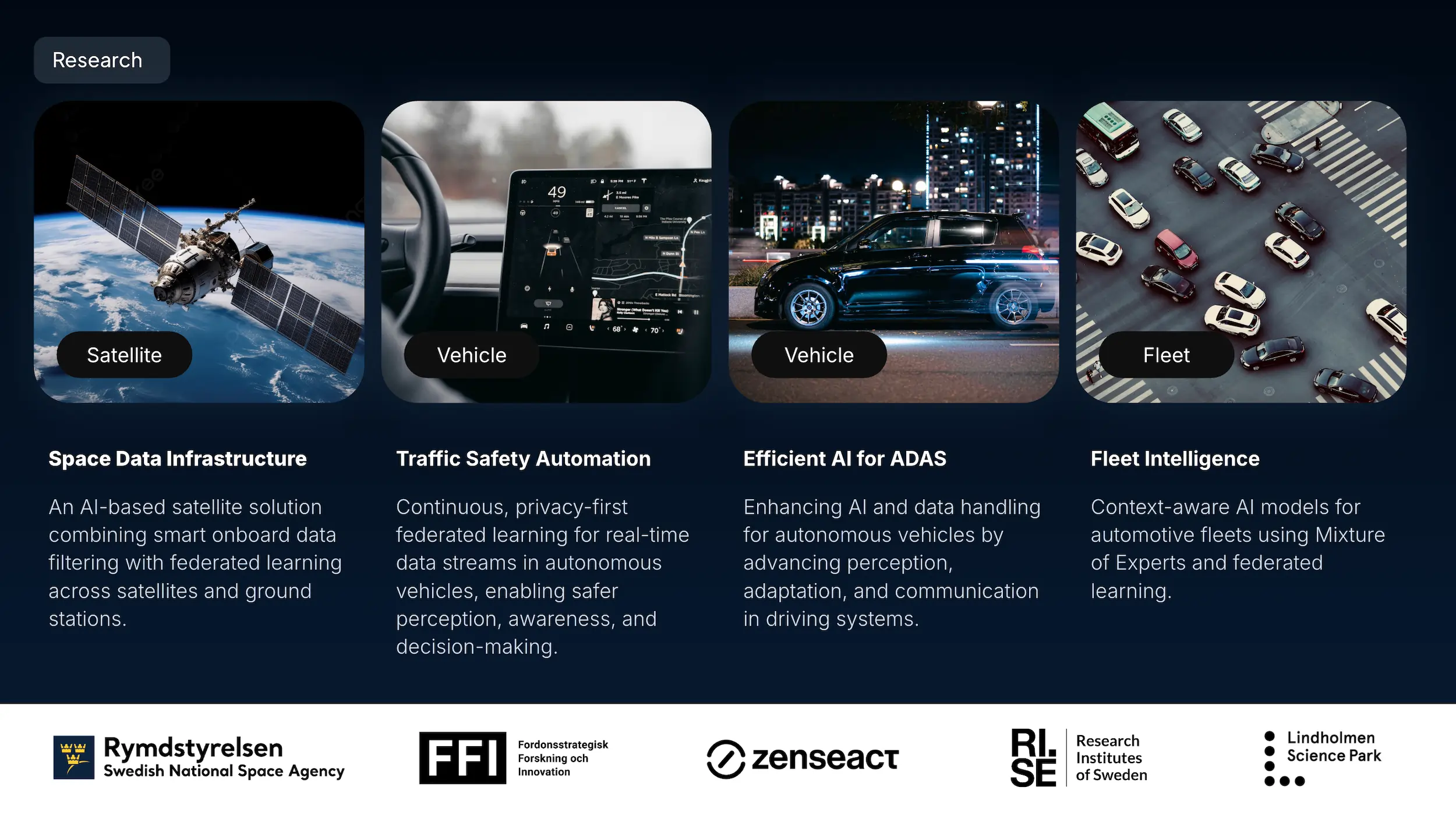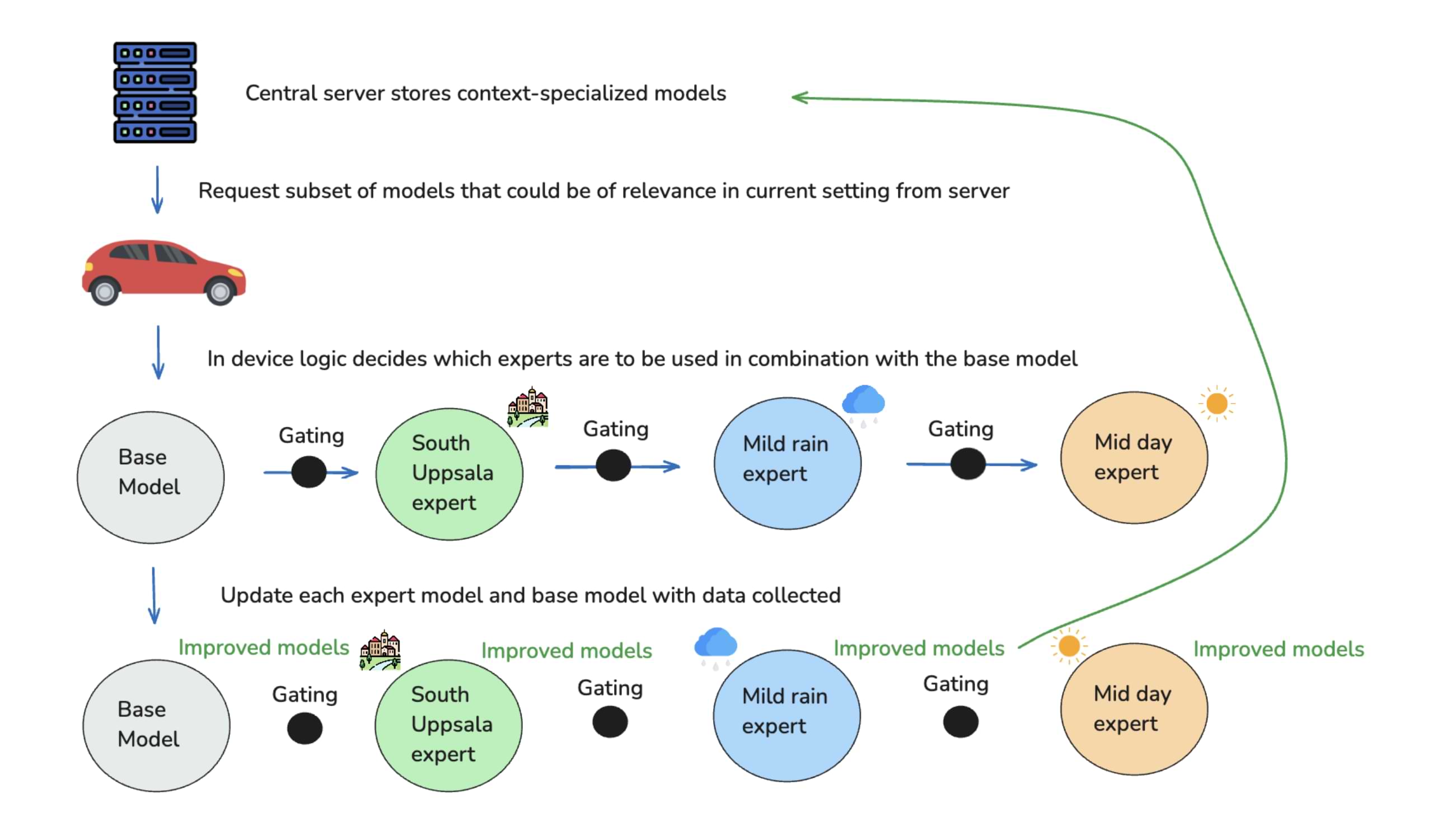
At Scaleout, research and development are at the core of our work as a deep tech company. Our approach is grounded in advanced machine learning and distributed systems, with a focus on building practical solutions that address real challenges in areas such as satellite communications, autonomous vehicles, and fleet intelligence.
We are committed to contributing new ideas and technologies that move the field forward. Each project described below reflects our ongoing efforts to explore complex problems, collaborate with partners, and deliver AI-driven systems that are secure, efficient, and effective in real-world settings.
Partners: Rymdstyrelsen, Scaleout
Satellites are essential for monitoring climate, responding to disasters, ensuring connectivity, and supporting defense operations. But growing demands on satellite networks, combined with constraints like limited bandwidth, geographic coverage, strict data protection, and the need for rapid, actionable insights, challenge both civilian and military operators. Our latest research project at Scaleout aims to improve satellite communications by drastically reducing bandwidth requirements and introducing artificial intelligence for dual-use missions.
The core innovation combines two technical advances:

The project will deliver a prototype tested in three challenging use cases: anomaly detection in satellite telemetry, collaborative object detection in satellite imagery, and integrated defense scenarios to strengthen on-orbit C4ISR (Command, Control, Communications, Computers, Intelligence, Surveillance, and Reconnaissance) capabilities. Our approach enables Swedish and allied defense forces to gain timely, relevant intelligence, even in bandwidth-constrained or denied environments, while simultaneously enhancing civilian services like climate monitoring and disaster response.
By integrating advanced AI at the edge of space, Scaleout’s solution lets operators prioritize, analyze, and share data securely and efficiently, turning satellite constellations into more agile, resilient, and sustainable assets for tomorrow’s challenges.
Swedish National Space Agency: https://www.rymdstyrelsen.se/innovation/beviljade-bidrag/innovationsutlysning-2025-inom-programmet-for-rymdteknik-med-dubbla-anvandningsomraden/redefining-space-data-infrastructure/
Partners: AI Sweden, Zenseact, Scaleout, Ekkono
As modern vehicles are equipped with advanced edge sensors like LiDAR and cameras, the volume of real-time data generated has skyrocketed, creating unprecedented challenges for privacy, security, and on-the-fly AI learning. Traditional federated learning methods struggle with the demands of streaming data environments, such as those found in autonomous driving.
This research advances the state of the art by developing continuous, active federated learning for data streams. The approach enables vehicles and edge devices to adapt their AI models instantly to changing scenarios without retaining or transmitting raw sensor data. By combining streaming machine learning with privacy-preserving techniques, the solution keeps sensitive information secure, achieves compliance with data protection regulations, and remains resilient to cybersecurity threats. Only a minimal volume of necessary data is selected for learning, ensuring efficient, data-driven adaptation in real time.
This novel method enables continuous, on-device model updates for safer and more sustainable automated vehicles, while robustly preventing privacy breaches and reducing the risk of data misuse. The outcome: smarter, more responsive, and secure AI for transportation systems.
Partners: RISE, Zenseact, Scaleout, AI Sweden.
Autonomous vehicles and advanced driver assistance systems rely on AI to interpret complex environments and make split-second decisions. As modern cars generate enormous volumes of sensor data, from cameras, radar, lidar, and control systems, the move to fully decentralized, distributed AI is quickly becoming essential. Centralized data processing is not only costly and inefficient but also raises privacy and data transfer concerns.
This project is advancing vehicle AI through three key innovations:
The project will deliver an open, large-scale dataset for training and validating these new methods. The aim is to accelerate the maturity and scalability of federated learning for automotive AI, improving safety, adaptability, and the efficient use of resources.
Partners: Scaleout, AI Sweden, Zenseact
Digitalization has created fleets of vehicles and connected devices that generate massive streams of data. Managing and learning from this data at scale is challenging, especially when raw data cannot be freely shared for security or bandwidth reasons. Traditional cloud or edge architectures and even standard federated learning face limits in automotive and fleet intelligence, where each vehicle operates in a unique context.

This project leverages Mixture of Experts (MoE) architectures within federated learning to deliver scalable, efficient, and privacy-conscious AI for connected fleets. Instead of having all devices train identical models, MoE enables each vehicle or device to develop context-specific expert models, specialized, for example, for certain weather conditions or geographic regions. Only the most relevant experts are activated for each input and only compact, context-specific model updates are sent to a central server, drastically reducing communication and computation needs.
By building global models from a diverse set of experts, the system achieves:
This approach enhances fleet intelligence by shifting from generic “one-size-fits-all” algorithms to a collaborative ensemble of specialists. The result is a smarter, more efficient, and highly adaptive AI that optimizes maintenance, safety, and performance for real-time decision-making in automotive and edge environments.
To sum up, these projects reflect our ongoing efforts to advance applied AI and develop solutions for real-world needs. We look forward to sharing more updates as our research progresses.